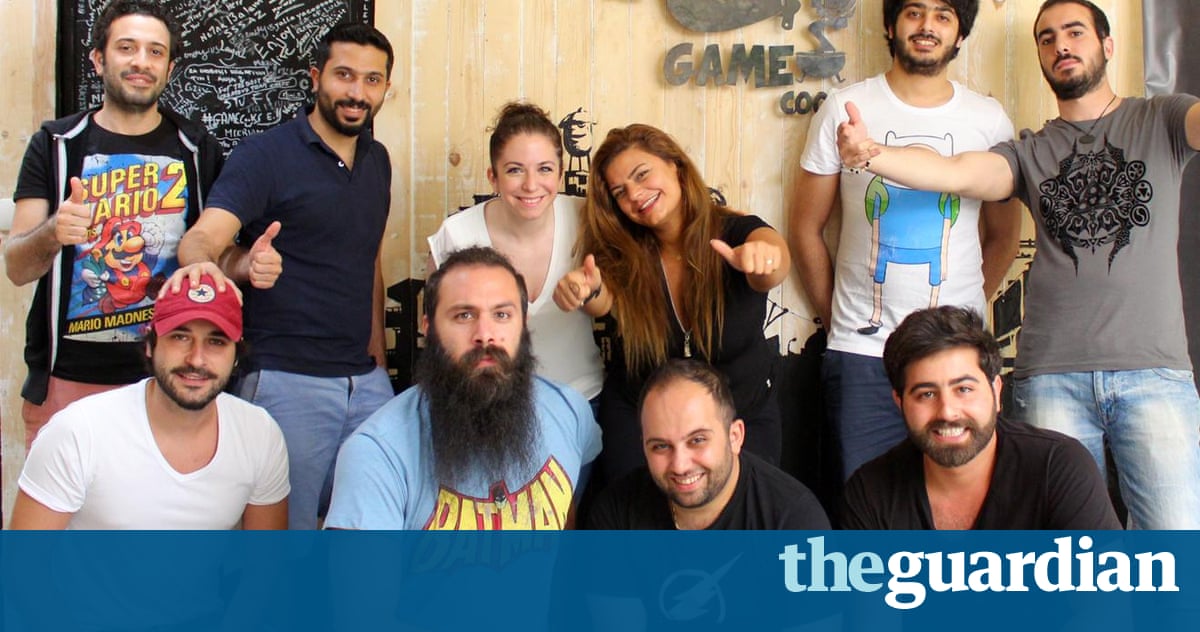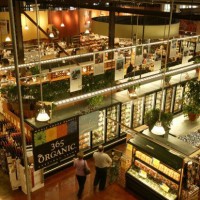Attitudes in the Middle East are changing and women leading by example in the tech sector are claiming an important role

If you left your country of birth in the midst of a war and found yourself in a promising career at Google, youd be forgiven for staying put. But Lara Noujaim had other ideas. The business graduate travelled from Lebanon to California in 2006 and, after completing an MBA at Santa Clara University, she found work in Americas thriving tech sector, joining Google as a Data Evaluator in 2010. Three years later, however, she gave it up to pursue a very different ambition: she wanted to help create a games industry back home.
I could have stayed and built a career in the States, but Im a very patriotic person, we all are in Lebanon, she says. The games industry didnt exist, I came home to be part of creating it. I wanted to give something back.
In the west, Middle East reporting is often focused on disaster. With much of the region in varying degrees of conflict and chaos, its easy to overlook any other more positive developments. While Lebanon itself isnt at at war, it has seen a huge influx of refugees from neighbouring Syria, with as much as a third of the population now made up by displaced people. Games are an escape, a way to have fun, says Noujaim. But for us in Lebanon, games are also used as a distraction from frustration at events in the country.
I applied and the rest was history
When Noujaim got home, she very quickly heard about Game Cooks, a studio founded during the Arab Spring bytwo brothers, Lebnan and Arz Nader. They released a game called Run For Peace, which celebrated the notions of peaceful liberation and revolution that prospered during the era. The game really grabbed peoples attention because it was about peace in the Middle East, but it was also a quite addictive game, says Noujaim. I was really impressed by what they had accomplished placing Lebanon on the global mobile gaming map. Around the end of 2013, I found out they were looking to grow the team and fill a marketing position, I applied and the rest was history.
While the years since the Arab Spring have dampened those hopes for peace and change, Game Cooks is still working in mobile games development and has recently released a retro-arcade shooter called PolyBlast. Its about putting a piece of us as a collective inside our games and creating something new, says Noujaim. Hopefully this will be a standard for what other games studios in the Middle East will create.
Noujaim is adamant that her status as a woman in a predominately male environment hasnt held her back. If anything, she claims, the people she meets are pleasantly surprised rather than antagonistic and part of why she came back to Lebanon was to pave the way for a new generation of female tech entrepreneurs. Compared to other countries in the world, a big proportion of companies in the tech sector here are being led by women, she says. These are often people who, like myself, worked or studied abroad and have come back to start something new in the country or help create a new scene.
Partnerships with the UK
Meanwhile, Lebanon has been actively seeking partners to help nurture its tech industry. The UK Lebanon Tech Hub is a joint government initiative created to support developing talent within Lebanon and establish a network with the UK. Lebanon has one of the best education systems in the world and, with technology proving lucrative across the Middle East, the government has begun to highlight the need to invest in its assets before talented individuals move abroad. The UK government recently hosted over 15 of the top Lebanese technology companies in London, providing workshops, mentoring schemes and networking opportunities with the hope that these companies may base operations or future projects within the UK or make use of its partnerships in the future.
Habib Chams, project manager of IFP group and a key organiser at the MENA Games Conference in Lebanon, believes there are growing opportunities for tech and gaming companies in the region right now. There are so many things here that are not highlighted, you have a lot of talent across the region, he says. Creating and gathering the community is important for us.
The MENA conference has only been running for two years but in that time its already attracted speakers and sponsors from businesses such as Google, Activision Blizzard and Ubisoft. This year, Chams is running a special session based on how to work with children specifically, refugee children. One thing that war does is stop children from playing, from being children, he says. I think today with education and games, we have a medium that can help NGOs and humanitarian organisations reach out to them.
The conference also provides an important bridge between cultures. Many Western companies have identified the Middle East as a developing market but without detailed knowledge on the audience and how the market differs its easy for even established companies to make mistakes. At the same time, the region needs investment and a boost in reputation to attract and retain talent. Eve Tamraz has a background in biochemistry and is co-founder of White Lab, creator of the Sensio AIR gadget, which identifies specific allergens in the air and provides tips to counteract them. Thanks to the UK Lebanon Tech Hub, White Lab has been able to make quick progress on its technology. The tech hub has really really helped in terms of education, says Tamraz. I had a scientific background and they gave me the means to understand the business side of things.
The startup scene in Lebanon is moving faster than Paris
Tamrazs educated background isnt uncommon among women in Lebanon. Children are generally taught to speak both French and English and for a lot of students, including Tamraz, gaining fluency involves travelling to universities in Paris or America to complete their studies. In this way, Lebanese students also gain a wider view of the technology sector. Based in London, Tamaz plans to return to Beirut in the future to help mentor the next generation of scientists and set up a specialised laboratory. The startup scene in Lebanon is moving faster than Paris, you can feel this this drive they have to make things happen, she says. If you give people the tools to grow of course theyll grow and they have such great ideas its incredible.
While Lebanon seems to have taken drastic steps to improve technology and has given significant freedom to startups to pursue this goal, Iran faces a different situation. There, the government has similar structures to support the tech industry however, significant success can draw the ire of the authorities or other agencies when it comes without their express permission or involvement.
Jasmine Rove is a games developer who now works for a large corporation in London, but also invests in startups in Iran. One of her companies produced the biggest mobile game in the country, Fruitcraft, and now develops a range of apps for the local market. Shes had to be extremely careful about discussing the game development scene in Iraq, but says attitudes are changing. The government has been massively supportive recently, says Rove. If they want the country to survive, theyve realised they have to invest in startups. You still have a weird political system, you cant get away from that, but theyre keen to get this off the ground.
Thanks to its progressive education system, discrimination and sexism against women in Lebanon is relatively unusual. The developing tech scene has made efforts to encourage women into technical roles and while stereotypical attitudes toward male and female roles persist, its mostly due to a lack of opportunity rather than active discrimination. l think its more a mentality in Lebanon, says Tamraz. Unless youre a doctor or an engineer youre not not really worth it, but things are changing.
Noujaim agrees. The problem isnt that you have misogynistic views preventing women from working in the tech field. Its the fact that a lot of women still dont know they have the possibility to enter the tech industry; they dont consider it as an option yet. There are lot of workshops and initiatives coming into place to show to women early on when theyre still at school that this is a field they can make a contribution to, its not just for men. Part of the UK Lebanon Tech Hubs role has been to create mentoring opportunities and set up support groups specifically for women to create the connections they may not necessarily have made in Lebanon.
Greater obstacles
Women in Iran face greater obstacles, however. By law if I want to leave the country I have to get written permission either from my husband or my father, says Rove. I am still very much a second-class citizen … The weird laws are still there. Privately, women may be treated equally within the tech community, but oppressive attitudes clearly have an impact on development. It took us time to find really good women, says Rove. But now for example, our lead developer and director are women, within the actual ecosystem itself we want to be supportive. We want to help the next generation … If we dont do it, who will?
There is, of course, a real need for female mentors and role models throughout the tech industry generally, but in the Middle East the focus is on encouraging more women to apply the skills they have learned to tech. Foundations such as ArabWIC, Arab Women In Computing, which has chapters across the region, will help. Coupled with a developing tech market, the opportunity for change is tangible, despite the resistance of certain government and religious agencies.
Zeina Saab is the founder of The Nawaya Network which focuses on training and development for youths in poorer economic situations. Saab worked at the UN but returned to the Lebanon to start a social development programme. I didnt want to be in a highrise in Manhattan working in a cubicle from nine to five, she says. I wanted to be closer to the people we were seeking to empower and honestly I couldnt be happier.
The programme is designed to provide underprivileged and low-income youths with leads on employment and entrepreneurship opportunities. One scheme offered is a three-month full-time coding bootcamp called SE Factory aimed at helping those with computer science degrees who wouldnt usually be suitable for wider employment to reach jobs they may otherwise not be able to get. The pilot programme is specifically focused on the tech industry while many other job markets in Lebanon are saturated, the tech industry is still calling out for applicants. Zeina has worked with Fadi Bizri from the Bader Young Entrepreneurs Program and received funding from the Asfari Foundation (based in the UK), Bank Audi and Bank Almawarid, with a view to rolling the scheme out nationwide if the pilots prove successful.
With such an overcrowded job market, stringent checks are made in Lebanon to prevent refugees working. While there are means to get around these checks with freelance work, theres clearly a lot more that can be done to build on the talents and skills 1.5 million displaced people have brought from Syria. In contrast with other industries, tech in Lebanon consists of a number of startups with a growing number of high paying jobs available, many refugees possess the technical ability to do these jobs but simply dont have the opportunity or networking skills in place to reach them.
Theres always the spectre of civil war and a repeat of sectarian street battles, says Saab. Id see young men on the streets ready to pick up a gun and kill their neighbour based on their political or religious affiliation. I thought about what was missing in their lives, what caused them to do this? It was obvious: a lack of opportunity, lack of hope. It was total despair they had nothing to lose … we wanted to create a network to open doors for these youths so they felt valued and could regain some of their dignity, to be part of a movement to make the most of their talents.
Its clear attitudes in some regions of the Middle East are changing and women leading by example in the tech sector are claiming an important role. Civil war held Lebanon back for decades, now theres a sense among entrepreneurs that the time is right to build something that could lead the country away from its troubled past and toward a prosperous future.
Some names have been changed to protect the identities of people interviewed.







